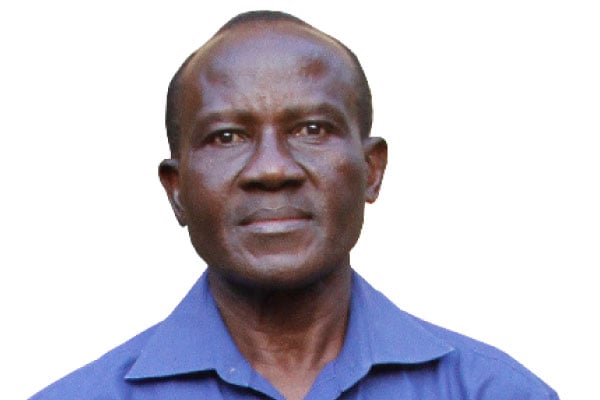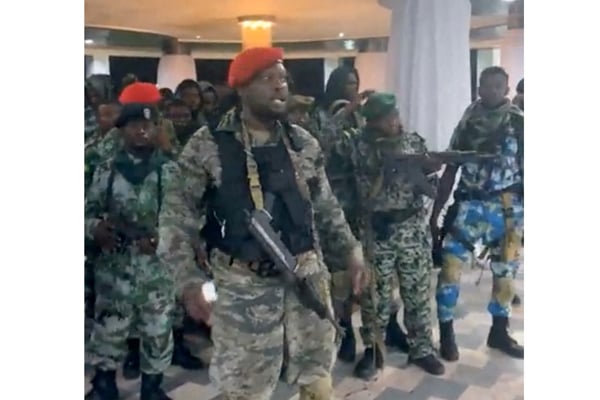Prime
Pastors’ fight defiles God’s sacred temple

COMBO: Pastor Robert Kayanja of Miracle Centre Cathedral, Rubaga, and Jackson SSsenyonga of Christian Life Church, Bwais. PHOTO/ FILE
What you need to know:
- The Pentecostal Church is embroiled in internal conflicts and power struggles, exacerbated by allegations of corruption, manipulation, and a close relationship with the government.
An internecine fight in the Pentecostal Church has renewed calls to hasten the enactment of a policy to regulate religious organisations.
Amongst a raft of government proposals in the draft policy, faith-based outfits are expected to be registered, train their pastors in theological doctrine and have a cordial relationship with government.
In the view of the state, some pastors especially in the Pentecostal Church who preach the message of fire and brimstone, are purveyors of a false gospel and manipulate their flock by faking miracles.
The framers of this policy argue that when religious practice is unfettered, it manifests into a potent form of fanaticism and could turn into a breeding ground for crime.
For the exponents of regulation, the recent fight between pastors Robert Kayanja of Miracle Centre Cathedral, Rubaga, and Jackson SSsenyonga of Christian Life Church, Bwaise, legitimises the enactment of a policy to regulate the Church. These pastors have recently traded barbs before their congregation over grave allegations touching on subjects such as debauchery, sodomy and other grave sexual offences.
Smear campaign?
“It’s on record, Pastor Ssenyonga has made over eight press conferences. What he is trying to explain, I don’t know! Why would I spend [time in] all those press conferences? Explaining what?” Kayanja is seen speaking to the congregation in a video shared on various social media platforms.
Kayanja says during one of his news conferences Ssenyonga told lies by purporting that he wrote a letter to him and he refused to respond to him.
“Are you [Ssenyonga] the secretary general of the United Nations? I answer you for what?” Kayanja asked, adding, “No one individually has the power to go and arrest, jail, prosecute and sentence to prison. These are the offices that are responsible for that, it is the Constitution of Uganda, the Penal Code [Act], the Police, the Anti-Corruption [Court]…… So, if you see someone in court, don’t say it is political, there has been a process, statements have been made.”
Kayanja also said thus: “Many of you have been asking questions and heard somebody say boys were arrested and detained, they were sodomised, I don’t have keys to Uganda Prisons. The case is before court, you go on social media, don’t because people may drag you to court and they may not be merciful, some of us are very busy, we have no time … We have people to feed, we have the continent to reach, we have problems to solve. The rest is coming, you will hear about. Mobilising people against somebody is against the law.”
Kayanja alleged that his rival has hired young people to engage in a smear campaign. “Don’t be used because those who are using you, they don’t use their children, like Pastor Ssenyonga’s son, he used to come here to see my son on several occasions, how come we didn’t sodomise him?”
Salvos fired
The row has sucked in their families as Kayanja’s son—Robert Kayanja Junior—recently drew a line in the sand, warning those who are seeking to drag his mother, Jessica Kayanja, in the mud.
“But you can’t text my mother, like I said Kayanja men are fine, you can keep it with us. You are causing tears in the hearts of so many with lies,” Kayanja Junior protested.
Ssenyonga had told his congregation to disregard the narrative perpetuated by “some small pastors” who say I am destroying the body of Christ.” He added that addressing claims made against the Kayanjas will be for the betterment of the church.
Ssenyonga said: “If he actually is training other people to do the same and he takes money and invests in that activity so that it is promoted, it is expanded and done on a larger scale, if its true that he even calls people to ask them for accountability, how far have you gone, how many people have you spoilt….that is not a personal weakness, that is a campaign against our sons, against our generation, that is something that someone wants to do on a larger scale.”
Pentecostalism
Ssenyonga claims that his rivals have attempted to divert him from God’s call to cleanse the Pentecostal Church of sin by targeting his daughter who has struggled with addiction in the past.
The Pentecostal Church, largely a break-away from the dogmatic doctrine of the mainstream Anglican and Catholic churches, has grown by leaps and bounds in the last decades. In the last population census, the Pentecostal Church registered the biggest growth between the years of 2002 to 2014 as it expanded from 4.6 percent to 11.1 percent.
For instance between 2002 to 2014, the numbers of the Catholic Church, which is the largest denomination fell from 41.6 percent to 39.3 percent, the Anglican Church, the second largest church registered a decline from 36.7 percent to 32 percent, the Muslim faith grew slightly from 12.4 percent to 13.7 percent.
In a research paper titled, Religious Conflict among Pentecostal Churches in Uganda: A Struggle for Power and Supremacy” authored by Alexander Paul Isiko, he proffers that, “Born Again church pastors, as collective agents are in contestation over several domains, including ideology, morality, power and leadership, personality, and space/place.”
Spiritual entrepreneurs
Isiko reveals that before the 1980s, Pentecostal Churches in Uganda were classical in nature. They had streamlined institutional governance structures, in which the senior pastor, if any, did not espouse power supremacy.
“There were neither intra-church nor inter-church conflicts between these churches. For, all these churches had the same goal, that is, a struggle to survive in a threatening political environment; which demanded for their total ban,” he notes.
The new political environment after 1986, Isiko adds, enabled Born-Again churches to thrive, an assessment Pastor Michael Kyazze of Omega Healing Centre agrees with.
“In the 70s the underground church was peaceful because they had one common denominator and one common accuser—the army and the President was breathing down their neck trying to kill them,” Kyazze says, adding, “Now you are free to relate with reason [...] it is time to enjoy the liberties given to you by the Constitution and that is where differences emerge and diversity of expressions come up which may bring criticism, division but may not defeat the overall purpose until you are conflicting against one and another.”
Televangelism
One of the major tools in the pastors’ fight for supremacy, is through broadcast media.
“More than 50 percent of the television stations are religious-based, distributed between Pentecostal Churches. Media fuels competition for listenership and viewership, advertising business and conflict … Media is a site for projecting power and influence at the expense of rivals,” Isiko reveals.
Kyazze opines thus: “Media brings a lot of trouble when the one using the media is sending the wrong signal. That brings agitation, division that brings malice, showing off [...] And we contest with the acted testimonies and the broadcasted lies by those who dominate our faith because they have the media.”
Isiko traces conflict within the Pentecostal Churches to 1987 when an intra-church conflict gripped the Redeemed Church, Katwe.
He writes: “This was a conflict of succession between co-pastors, after the death of a Ghanaian pastor, John Obiri Yeboah, who had influenced many of the Born Again pastors in the country in the early 1980s. The intra-church conflict led to a split, with three new churches emerging, ultimately breeding an inter-church conflict, an incident which Religious News Blog (2007) documented from its interaction with Pastor Solomon Male.”
He adds: “The conflict was between Pastor Simeon Kayiwa, Pastor David Makumbi, Pastor Deo Balabyekubo and Pastor Samuel Kakande. Whereas Pastor Simeon Kayiwa founded the United Redeemed Council, an umbrella group he claimed covered all the churches that could trace their origins to the late Ghanaian pastor, John Obiri Yeboah; Pastor David Makumbi of the World Evangelical Church, formed a rival umbrella body, the United Reformed Redeemed Council. On the other hand, Pastor Deo Balabyekubo and Pastor Samuel Kakande, claimed to have inherited the Ghanaian pastors’ powers and hence claiming succession.”
Life after Yeboah
The principal subject of rivalry, according to Isiko, was the inheritance of Yeboah’s ‘miracle working powers’. As a sign of inheritance, whereas Makumbi claimed to have been given shoes, robes and underwear by Yeboah, Kayiwa claimed to have been anointed and appointed by the same self-styled prophet.
The late Deo Balabyekkubo also claimed to have been given Yeboah’s bible and name of John as a sign of inheritance of Yeboah’s ‘powers’ and ministry. Pastor Samuel Kakande, with his wife Loyce, also claimed to have been specially anointed by Yeboah as prophet and prophetess. The two rival umbrella bodies fought over ownership and control of the Redeemed Church, Katwe, that had been the main church for Yeboah’s ministry.
Some of these pastors, who are proteges of Yeboah have anchored their message on the prosperity gospel peppered with fake miracles to amass wealth. Robby Muhumuza, a communications consultant, explains the close ties between the presidency and the Born-Again Pentecostal Church.
Muhumuza says: “Balaki Kirya, a freedom fighter based in Nairobi, was arrested by Obote’s forces and brought back to Uganda and put in prison.
While in prison in Luzira he became a Born Again Christian. When he came out of prison he was appointed Minister of State for Security in the Office of the President but because he was Born-Again, he became good friends with Born-Again leaders, including Robert Kayanja and that was how the Born-Again Church was introduced to the State House.
Muhumuza adds: “They sought protection, freedom of worship, they sought legal recognition, they were attracted to the Presidency and President Museveni. And because the President and NRM saw them as voters, who could vote as a bloc.”
Church and politics
In the clientele-patronage politics, pentecostal pastors have offered glowing prophecies in favour of the NRM and its leaders.
“If you look at the traditional churches, Church of Uganda and the Catholic Church, their view of prophecy is speaking truth to power, holding power or those in leadership or those in government accountable for their actions including negative actions. [..] The view of prophecy in the Born-Again Pentecostal Church is different,” Robby Muhumuza, a communications consultant, discloses.
To return the favour, the State has doled out several perks and also shielded some from prosecution. Joseph Kabuleta, a pastor at the Watchman Ministries, argues that “because of the Pentecostal Church’s proximity to the oppressors, the public can’t tell them apart and view the Church as the spiritual arm of the NRM.”
Kabuleta notes further that “when salvation comes to this country from this oppressive rule, it will be no thanks [from the citizens] to the Pentecostal Church which is a pity because unlike other religious leaders such as Catholics, Anglicans and Muslims who have spoken out about the plight of the people, the Pentecostal Church has not.”
The State and the Church have always been strange bedfellows. There is a likelihood that the State may only craft a stringent policy to control the Church if it feels threatened. All of which means fights within the Church will continue to take place.




